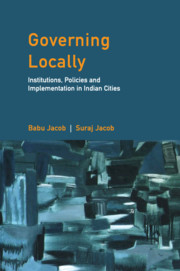2 - Approach and Argument
Published online by Cambridge University Press: 06 August 2021
Summary
Chapter 1 generated two puzzles of local governance. The first puzzle is why Surat and Trivandrum exhibit considerably different patterns of governance; it is indicative of state-level differences and the influence of history and institutions. The second puzzle is why India's major decentralisation reforms of the 1990s did not create a rising tide to lift Trivandrum's boat and that of other cities. Those reforms addressed many factors that could enhance local governance: changing laws, transferring resources, instituting regular elections and mandating forums for public participation. Although important, they proved to be insufficient. A plausible explanation of decentralisation outcomes will need to disaggregate these factors and explore the processes of implementation of the idealistic policy intent of the 1990s reforms. Such analysis leads us to emphasise institutional features of policy. Politics and power relations are never far in the account laid out in this chapter; they form the crucible for processes around governance.
Since explanations of such governance puzzles invoke the past, this chapter starts with a brief history. Appendix 2A presents a more detailed history of decentralisation and urban governance in India. Since colonial times, local governance was placed in the domain of provincial rather than national government, an arrangement that continues even today. For decades after Independence, local governance was a pushover and whatever residual emphasis was given to it went to rural rather than urban local government. A watershed moment occurred with the constitutional reforms of the 1990s. The official statement observed:
In many States local bodies have become weak and ineffective on account of a variety of reasons, including the failure to hold regular elections, prolonged supersessions and inadequate devolution of powers and functions. As a result, Urban Local Bodies are not able to perform effectively as vibrant democratic units of self-government.
The 74th constitutional amendment (CA) adopted in April 1993 conveyed the intent that state government transfer a wide spectrum of urban policy functions to city governments. This was ‘to enable them to function as institutions of self-government’. The CA also laid out how city governments were to be constituted and the method of election and sharing of public resources between the state government and local governments. The CA required that state legislatures work out the details of decentralisation, and the states responded by enacting legislation.
- Type
- Chapter
- Information
- Governing LocallyInstitutions, Policies and Implementation in Indian Cities, pp. 28 - 74Publisher: Cambridge University PressPrint publication year: 2021



